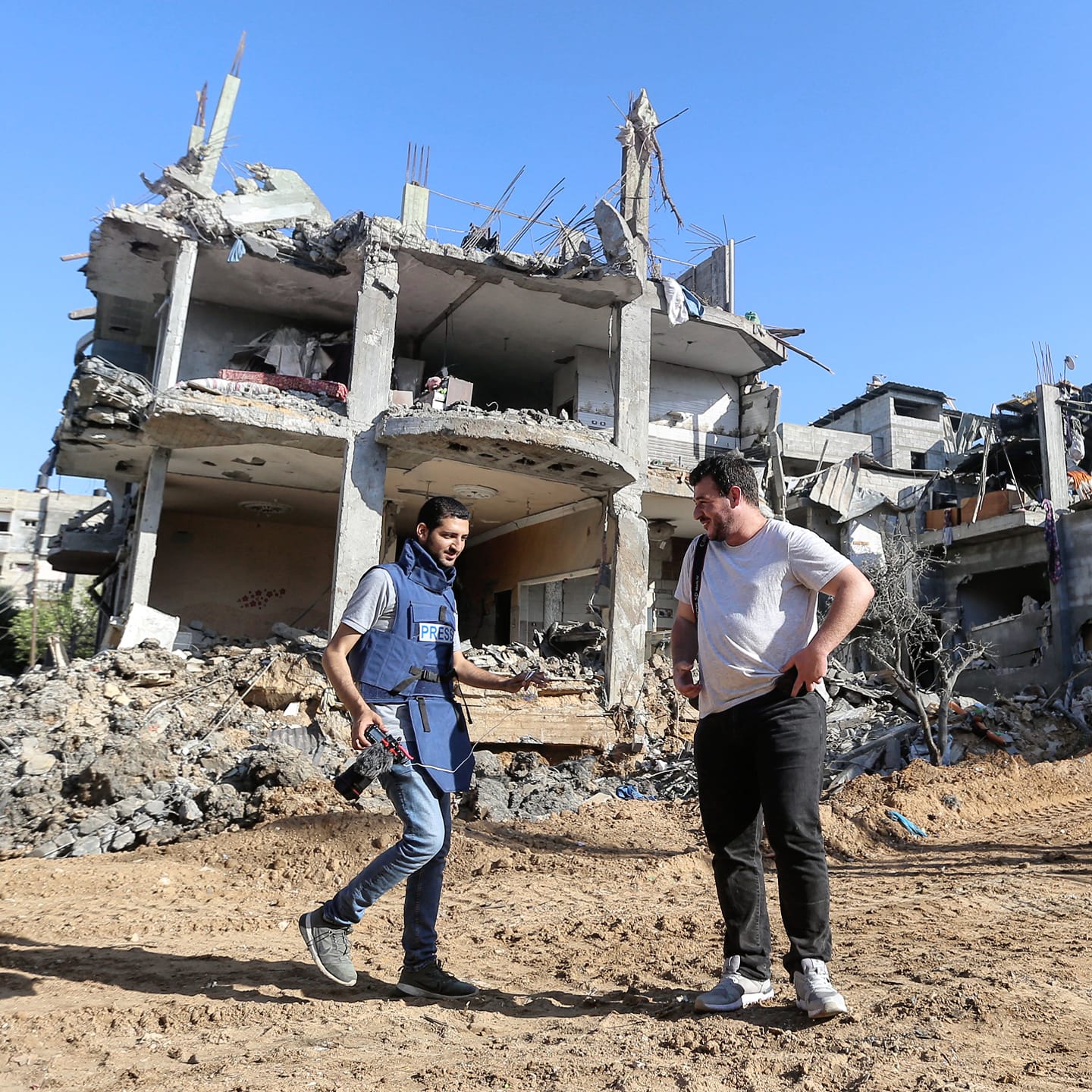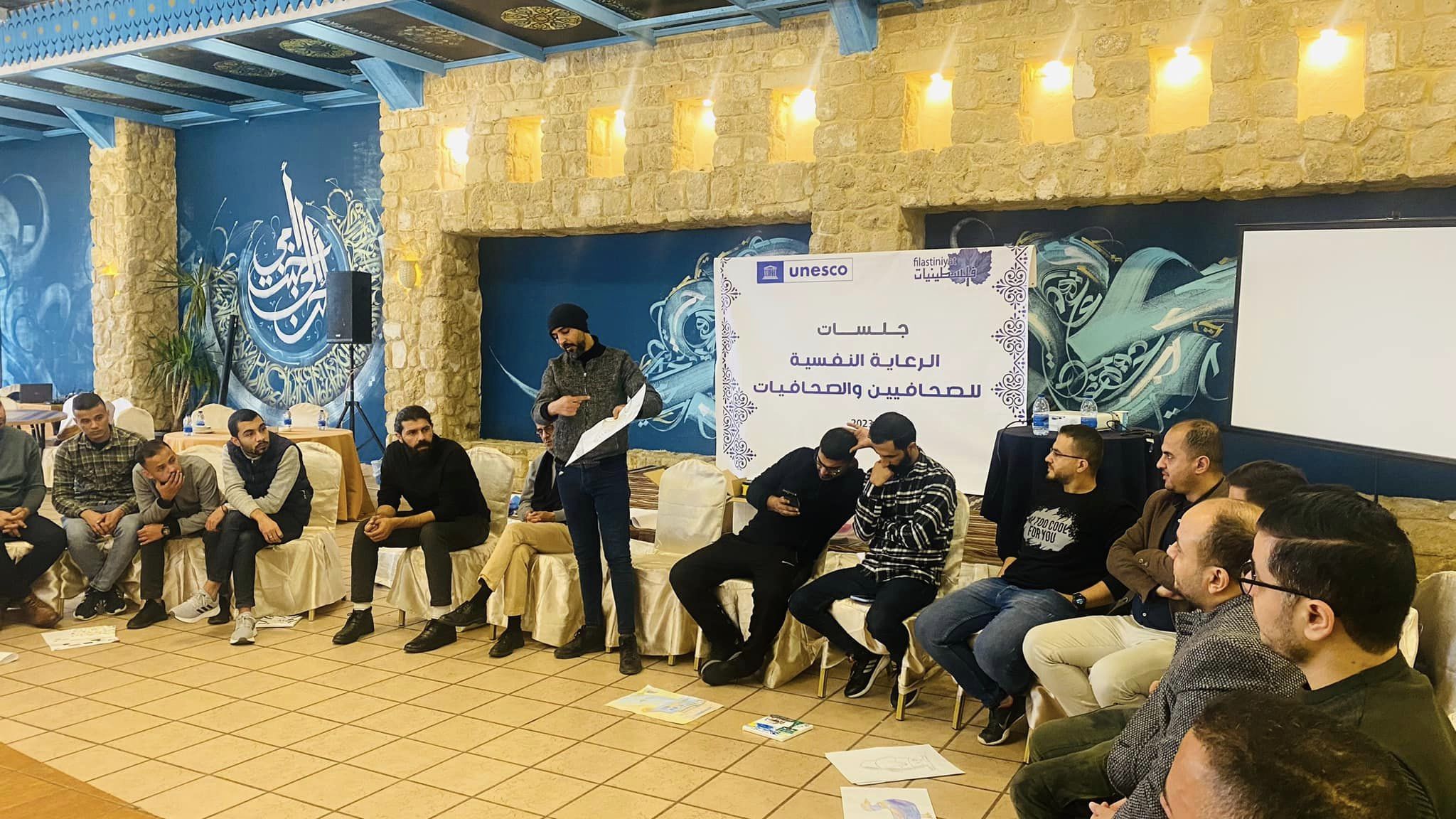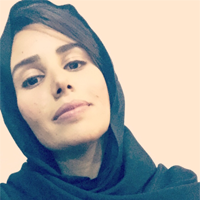ما إن تنتهي تغطيات العدوان، حتى تنكشف آثاره في قلوب صحفيين وصحفيات غابوا عن منازلهم من أجل نقل الحقيقة. هنا في قطاع غزة حيث تنقلب الأمور مرّة واحدة بصاروخ إسرائيلي على هدف ما لتشتعل جبهات القتال؛ كيف حال الصحفيين في كواليس عملهم؟ إليكم القصة:
حسناً، أدَينا الرسالة على أكمل وجه. تقدمت مكاتب العمل بوافر الشكر، بعضهم صرف مكافآت والغالب بالكاد يصرف الرواتب. أثنى الناس على دورهم المهم. وقفوا خلف الكاميرا، لكنهم لم يقفوا أمامها كإنسان. هل نجونا؟ عن الأعباء النفسية للصحفيين سنتحدث.
حسام سالم ٣٣ عاماً يقول إن تغطية العدوان على غزة من أقسى ما يمكن أن يعانيه الإنسان، يفقد نفسه تماماً، بل يكون مغيباً وكل همه نقل الصورة وبثها للعالم. يظل على رأس عمله ولا يعود إلى منزله إلا بعد إعلان التهدئة حتى وإن امتد الأمر لنحو شهرين كما حدث في العدوان الإسرائيلي عام ٢٠١٤ وما سبقه وما تبعه كذلك.
يقول حسام إنه لا ينام، ولا يجد الراحة التي ضلّت طريقها عنه بفواصل العدوان. لا يرى إلا مشاهد الموت التي التقطتها عدسته، لا يضحك حين يسمع نكتة، بل يضحك "بهستيريا" دون سبب واضح أحيانا.

يعمل "متعاونا"، ويخرج للتغطية وهو مدرك أنه ربما يحدث له أمر سيء، يمكن أن يجرح أو يستهدفه الاحتلال بنيرانه مباشرة كما فعل بزميله المصور ياسر مرتجى الذي قضى خلال تغطيته مسيرات العودة وكسر الحصار في ٢٠١٨، والصحفي أحمد أبو حسين ومراسلة الجزيرة شيرين أبو عاقلة والصحفية غفران وراسنة في العام الجاري.
علّم ياسر نفسه بدرع الصحافة الذي كتب عليه Press بالبنط العريض، لكنه قتل. قتل برصاصة إسرائيلية استهدفته بمنطقة لا يغطيها الدرع. كيف لي أن أنسى؟ وكيف لي أن أتظاهر بأنني بخير؟ يتساءل حسام.
وفي مشهد مواز، حدث عام 2014 أن قتل الاحتلال أربعة أطفال من كانوا يلهون على شاطئ البحر، التقط لحظة وداع الأب للجثامين. لم يعرف كيف يتصرف، كيف تغلب عليه إنسانيته بالمواساة أم بمتابعة عمله وقلبه يجهش بالبكاء. لم يستطع البكاء، راح يحبس دموعه وصارت تحبس روحه كلما مر شريط ذكرياته أمام عينيه بلحظة ما.
عبد الله مقداد، صحفي آخر يعمل مراسلاً منذ 2005، يرى في تغطية "الحرب" نظاما خاصا واستثنائيا يعيشه الصحفيون في قطاع غزة، فهم المحاصرون المحرومون من فرص التدريبات الخارجية، وهم الذين اكتسبوا خبرات ومهارات من الميدان عن طريق الصدف.
لا يغيب عن بال عبد الله حين هاجم الاحتلال غزة في 2006، يوم أسرت الفصائل الفلسطينية جلعاد شاليط في غزة وتطوّر الموت في الضربة الأولى للعدوان الإسرائيلي عام 2008.
يصف ما حدث قائلاً "على مد بصري شاهدت جثامين الشهداء، تجولت بينهم في الممرات وفي الساحة العامة، عشرات الجرحى يطلبون إسعافهم وبعضهم يلفظ أنفاسه الأخيرة".
وما بعد العدوان ليس كما يجري خلاله، يكون العمل أقسى وأصعب على الصحفيين والصحفيات، فتنكشف التفاصيل بعد انقشاع غبار المعركة، ينفضون رماد الحرب عن الناس في التغطية، يتأملون أوجاعهم ويحاولون ترجمتها للعالم.
يزيد عبد الله: "في اللحظات الأولى تكون الرواية سريعة والألم واحدا، لكن لاحقاً تصير التفاصيل أكثر رعباً، وسماع قصص الناس ليس سهلاً، السؤال عن التفاصيل ليس سهلاً، اكتشاف الفقد في عيونهم ليس سهلاً".
تمكّن الصحفي من السفر بعد عدوان 2021، لكنه لم يشعر بتحسن كبير. يتحدث عن عصبيته المفرطة، أصبح لا يتحمل الأحاديث العادية غير الجادة. صار يحب العزلة، يعاني اكتئابا، ولا يستطيع الثبات نفسياً فالعدوان وأصوات الصواريخ وصور الناس ومشاهد الجرحى والناجين تحت الركام كلها تلاحقه أينما لف وجهه!
يعيش في قلق مستمر، وأكثر ما يفكر به أسرته وتحديداً أطفاله، يقلق عليهم ويقلقون عليه حتى لو ظهر على الشاشة لحظة اشتداد الضربات، يعيشون خوفاً مضاعفاً، أحياناً يطمئن قلب الإنسان بمن حوله وهنا يردد الفلسطينيون في غزة مثلا شعبيا مؤداه "الموت مع الجماعة رحمة"، "لكنّ عائلاتنا نحن الصحفيين من هذه النعمة محرومة! فأي جحيم هذا الذي يسكن قلوبنا ويباغت سلامنا في أي وقت يرغب فيه الاحتلال شن عدوانه؟" يسأل عبد الله.
أكثر ما يخيفه أن تعيش غزة حرباً جديدة، ليس على نفسه بقدر خوفه على الناس. يردف "لا أريد أن أشاهد مجدداً الناس تنزح من منازلها تحت القصف، لا أريد أن أرى مجدداً مشاهد الجثث على الأرض وتحت الركام".
لدى مريم أبو دقة، التي تعمل مصورة قصة أخرى إذ لا تقل مأساتها عن زملائها. تقول إنه بعد انتهاء التغطية في "الحروب" والإعلان عن التهدئة، تتذكر لقطات الجثث عن ظهر قلب.
مريم التي بدأت عملها عام 2016، بعد عامين وجدت نفسها في مسيرات العودة وكسر الحصار أمام تحديات عظيمة بالميدان، تعمل "متعاونة"، ليس لديها درع يحميها ولا خوذة. تغطي في منطقة خزاعة شرقي مدينة خانيونس التي تتوسط قطاع غزة. لم تكن تعرف أين يجب عليها الوقوف لالتقاط الصورة، ومتى تنسحب وكيف تختار مكانها.
ولعلّ هذا كان أهون من الذي مرّ عليها بعدوان مايو/أيار 2021، حيث كانت الضربات مستمرة من شمال القطاع حتى جنوبه، لا وقت للراحة ولا فرصة للتفكير بالأنفس: أطفال وشباب وشيوخ، كلهم مستهدفون، ومسؤوليتنا بث المشهد للعالم الذي يتابع غزة في فرص موتها تحت القصف.
لدى مريم ابن وحيد ترعاه وتخاف عليه، ودائما يطمئن عليها حين تخرج للتغطية.
وعن فرص الدعم النفسي التي حصلت عليها مريم، تخبرنا أن مؤسسة "فلسطينيات" التي تعنى بالإعلام في قطاع غزة ومقرها الرئيسي بالضفة الغربية، هي الأولى التي سألت عن حاجة الصحفيين والصحفيات لجلسات تفريغ نفسي، فعملت ضمن برنامجها "الرعاية الذاتية" على استقطابهم لدعمهم نفسياً عبر جلسات مع مختصين.
وفي مقابلة مع منى خضر، منسقة البرامج في "فلسطينيات" تقول إن مؤسستها أطلقت برنامج "الرعاية الذاتية" بعد العدوان الإسرائيلي عام 2014، انطلاقاً من حاجة الصحفيين والصحفيات الملحة له، في ظل الضغط النفسي "المرعب" الذي يعيشونه، إذ لا ينفكون عن نقل الصورة دون الاهتمام بأنفسهم أو أخذ قسط من الراحة.
ولقصف المؤسسات الإعلامية من قبل الاحتلال بشكل متعمد ومقصود، توابع نفسية ساهمت بتدمير صحة العديد من العاملين في الإعلام، جعلت مؤسسة "فلسطينيات" تتحرك بوتيرة أسرع خاصة في آخر عامين، إذ استهدف البرنامج نحو 500 صحفي وصحفية في القطاع، وفق منى.
وتردف: "بقدر إمكانياتنا شعرنا أنه من المهم الإسراع بالاستجابة للحالة التي يعانيها العاملون في الإعلام لوقوعهم تحت حصار يمنعهم من السفر، فالإمكانيات صعبة وغالبيتهم يعمل بنظام العقد والكثير منهم على بند المتطوعين".

يقبل الصحفيون على التسجيل إلكترونياً باستمارات تنشرها المؤسسة لتقيّم أوضاعهم، ثم يستجيبون فوراً لجلسات يعلن عنها لاحقاً ورحلات ترفيهية، ثم جلسات متخصصة بمجموعات أصغر تمهّد لجلسات فردية تكون فترتها أطول وسريتها تامة، وتعقد جميعها بالتعاون مع مركز غزة للصحة النفسية وأطباء مختصين من الهلال الأحمر وأيضاً مختصين نفسيين من الخارج.
وبالتزامن مع ذلك، أطلقت "فلسطينيات" دليلاً أسمته "الرعاية الذاتية والنفسية للعاملين والعاملات في القطاع الإعلامي" يرشدهم لكيفية التعامل ذاتياً في حالات التفريغ وضبط النفسية، لكن هذا ليس كافيا بالنسبة للمؤسسة التي توصي بضرورة وضع المؤسسات الإعلامية هذا البرنامج باستراتيجياتها من أجل السلامة النفسية للصحفيين.







































